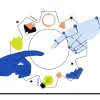What To Do When Vendor Relationships Go Sour
Just as with personal relationships, businesses-to-vendor relationships usually start out great. The birds are singing, the skies are blue and the air is thick with promise of good things to come for both parties. But somewhere along the way things can begin to sour over time. Perhaps the vendor response times begin to lag or their costs begin to creep up to levels beyond what you’re comfortable paying for their services. You may begin questioning the validity of their services, until finally, one day, for whatever the reasons may be, it becomes time to move on.
Occasionally at 90 Degree, we find ourselves in a position that can best be likened to the new girlfriend trying help get their boyfriend’s stuff back from his psycho ex-girlfriend. Typically our case, the “stuff” we’re trying to help get back are the some essential digital marketing assets that should really belong to the client. This could be anything from a website, to an email list, or even their own Google My Business page.
The reality is, many agencies may not try very hard to help you get your old website back. After all, a client with a missing website equals an opportunity to build them a new one for $_________! Alas, we at 90 Degree, have this nagging little thing called a conscience and we always try our best to help the client get their stuff back or, better still, avoid this situation entirely. We strongly believe that you should want to continue working with a vendor because you maintain a great working relationship; NOT because they have the “keys to the kingdom.” So in that spirit, we have also come up with a few insider tips on how to protect your brand’s assets.
How To Protect Yourself From Dishonest Vendors
Always register and renew your own domains!
We cannot stress enough how important this is. Don’t let yourself think, “I’m not a techy person. I can’t register a domain…” YES YOU CAN! It’s not that hard. Go to a registrar like GoDaddy, find a domain, create an account, save your credentials somewhere safe and that you will remember them (VERY important step here) and purchase that domain. NEVER have your “webmaster” (even us) do it for you.
Make sure you have Admin level credentials.
If your website is in a content management system such as WordPress® or Joomla®, make sure your website vendor gives you Administrator level credentials (provided that this was in compliance with your agreement with the vendor). Keep those credentials in a safe place.
Understand your website hosting plan.
Your website host, is literally where your website lives. It is important to know where your website is hosted and, if possible, how to get into your hosting account.
Read your vendor’s terms of agreement.
Anytime you begin a new relationship with a vendor, make sure you understand the terms of their agreement together and always get it in writing. Do they own the website or do you? Do they own the code and you own the content? There are lots of different arrangements out there when it comes to website development so make sure to have a frank conversation with your vendor so you’re both clear with each other.
Make copies whenever possible.
For smaller sites, it’s a good idea to keep a Word Document or something similar that contains of all the content on each page. This way, in a worst case scenario, your website can quickly be rebuilt.
Keep a record of your usernames and passwords.
Make sure that you keep a spreadsheet or better yet a password keeper that contains user names and passwords for all your digital assets. In the case of email lists, make sure you keep an up-to-date backup of your mailing list in a .csv file that can easily be reloaded to a new system.
Hopefully nothing like this will ever happen to your business! If you’ve found yourself in the unfortunate position of having to end a vendor relationship but are unsure about whether or not you will be able to retain your assets, please reach out to us. There are other ways we can help. And we promise not to try and sell you a new website unless it’s truly absolutely the very last (and best) option!















